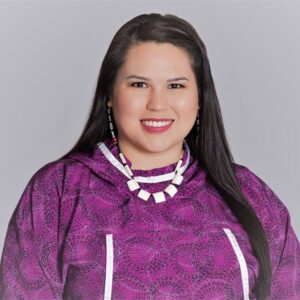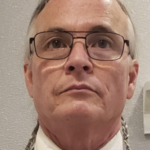Yvonne Jackson has made a career out of helping people advance their own. Based in Alaska, Yvonne started Alaska Rural Professional Development LLC (AKRPD) after noticing disparities between rural Alaska schools that offered soft skills and occupational training, and those schools that do not. While most Tribal workforce programs focus on college preparedness and vocational training, Yvonne focuses on the skills—including leadership and management, career development, sales and marketing, Microsoft Office, and more—that are crucial to success for those that choose to enter the workforce. Yvonne has also found these skills to be crucial to helping students complete their primary education; her research showed graduation rates at one school that offers soft skills training to be 94%; the graduation rate among rural schools that do not offer these services was 15%. AKRPD also works to help people on temporary assistance obtain, strengthen, and maintain employment skills and to get hired.
AKRPD is already working with 17 tribes in Alaska, and tribes from the lower-48 states continue to inquire about Yvonne’s work and programs. We hope you enjoy our interview with Yvonne and learning more about her work to grow opportunity for rural and Native Alaskans.
- Tell us about yourself and your organization?
My name is Yvonne Cingarkaq Jackson and I am a member of the Kasigluk Traditional Council. I am the Founder and Chief Executive Officer of Alaska Rural Professional Development LLC (AKRPD), a company I started after noticing a lack of companies offering training in soft skills, professional development, and occupational skills for jobs that don’t require a college degree. This is especially important after reviewing high school graduation rates among students in Rural Alaska. After working as a Tribal Workforce Development Director for the Association of Village Council Presidents (AVCP), I decided to start AKRPD in order to offer these services to rural Alaskans.
I came from rural Alaska; I grew up in Kasigluk which is located 30 miles Southwest of Bethel, Alaska. I speak fluently in the Yup’ik language, which is the most commonly spoken Alaska Native language. Like the majority of Alaska Natives, I didn’t graduate from college, but I worked my way up the career ladder in Workforce Development, mainly through taking advantage of all the training programs and networking opportunities made available to us through organizations like The National Center. I wanted to demonstrate to the people that I am serving and that if I can do it, they can too.
There are many Tribal services programs that are designed to support workforce development activities, and I want to be a part of the success. While college and vocational training opportunities are a great avenue to pursue and reach employment goals, I think it is equally important to advocate for the teaching of soft skills, employability skills, and basic occupational skills. I provide these services where no one else does and my business is at a rapid growth stage right now because demand is so high.
I am currently working on three contracts right now with AVCP (my former employer), Alaska Native Tribal Health Consortium – Alaska’s largest hospital, and the Bristol Bay Native Corporation. I am continuing to receive training requests from other organizations including the Knik Tribe, Nenana Native Council, and many others. I have 17 Tribes in Southwest Alaska who have selected ARKPD as a sole source provider for soft skills training.
Tribal organizations in the lower 48 states have called to express interest in participating in future summits that I would like to put together.
- What inspired you to get involved in the professional development field?
I saw a need in Alaska back in 2018 when I was working as a Tribal Workforce Development Director for the Association of Village Council Presidents (AVCP). At the time I was also working for the school district’s boarding school, The Kuskokwim Learning Academy, as a Residential Supervisor. Last year, this school had a graduation rate of 15%. All of these students were from Rural Alaska. As years passed, I saw only a select few, perhaps fewer than five students, who went on to higher education with vocational training or college, if any.
This was very alarming to me. I compared the graduation rates of other boarding schools in Alaska and came across the Galena Interior Learning Academy which at the time had a 100% graduation rate. Last year it was 94%, which is still very high considering transitioning through a new learning environment during the pandemic. I called the principal of the school because I needed to learn what they were doing right. I wanted to replicate what they were doing to increase our graduation rates, too. I learned that they provide vocational training and soft skills training to the students in Galena, as well as life skills training. I graduated from the Bethel Alternative Boarding School which operated very much like the Galena boarding school, and many of my classmates have had a lot of success during and after high school.
While I was looking at statistics and data, I also collected data on families in rural Alaska who were on public assistance. We had over 800 families on Temporary Assistance for Needy Families (TANF) alone. That didn’t include other low-income families unemployed. I developed the AVCP Workforce Development Program to help these individuals strengthen their employability skills and to obtain and maintain employment. The biggest challenge we had with providing opportunity to these individuals was that they weren’t willing to or ready to leave their families or subsistence lifestyle to pursue higher education. So, I looked for a training vendor who can provide online training in soft skills, professional development, and occupational skills for jobs that don’t require a college degree or vocational training certification. I couldn’t find one, let alone, a training vendor or organization that was familiar with the rural Alaskan culture, or even anyone who spoke the language.
My goal was to hire this training vendor to provide these services to rural Alaskans, teach high school students and everyone else the soft skills that lead to jobs or advancements in careers. Since there wasn’t a training vendor in Alaska that fit this profile and services, I left my position with AVCP and to build AKRPD.
- How has your model changed/how have you responded to the pandemic?
I originally had planned to provide professional development training to high school students and the unemployed workforce. However, after the pandemic, I begin informing all the organizations in Alaska about my services via video conference, the request for training current employees grew in high demand. Honestly, I think the pandemic hurt the workforce over the last two years the most, and employers are taking advantage of everything they can to keep or grow their workforce. Luckily, this is what I specialize in, Workforce Development.
- What advice would you give to aspiring Native entrepreneurs or community leaders looking to make a difference in business or Indian Country?
I would recommend that they utilize all the resources that are available to them for helping navigate the entrepreneurship world. Find mentors, fill out those applications for services, get partners, join ALL the networking groups possible, and don’t stop. It might require working all day every day, but it’ll be worth it in the end.
- Anything else you’d like to add?
I would just like to say consistency is key to success. I’d also like to thank all the individuals, organizations, and businesses that seek local entrepreneurs and utilize us as vendors. It really helps us to grow!











